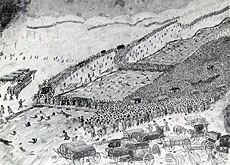Remembering Berezina

The Swiss Development Agency (SDC) has helped to build a monument in Belarus to remember those killed at Berezina during Napoleon's retreat from Moscow.
A thousand Swiss troops were among those who died defending the French emperor’s army as it crossed the river.
The disaster at Berezina – a tributary of the Dneiper in today’s Belarus – was the worst single event in Napoleon’s Russian campaign.
Some 25,000 troops and thousands of stragglers lost their lives as the Russians attacked the retreating army while it was split on both sides of the river.
The emperor’s men were heading home when they came upon the Berezina. With no way of crossing, they were forced to build a makeshift bridge. A large contingent of troops, including 1,300 Swiss were ordered to remain on the eastern side to fend off the Russians while the rest of the forces crossed the Berezina.
By November 29, after stopping a whole series of Russian assaults, there were just 300 Swiss left standing, but the emperor’s army had managed to retreat in orderly fashion.
Quotas for Napoleon
Today, the memory of Berezina remains strong. Among the French, the word is used to describe a complete and utter disaster.
But it was equally a tragedy for thousands of troops from other countries who were part of the 600,000 that originally set out to conquer Russia.
The risk of dying failed to discourage recruits from signing up to the emperor’s army. The Swiss were fairly enthusiastic about joining up – 8,000 were recruited for the Russian campaign alone.
Historian Alain-Jacques Tornare says money was the primary motivation to sign up. “You have to look at the economic situation at the time,” he told swissinfo. “Trade was bad, and people needed the money.”
The Swiss have a long record as mercenaries, but Tornare and others say Napoleon’s Swiss soldiers cannot be defined as soldiers of fortune because the authorities at the time were required to provide quotas for the emperor’s campaigns.
“The Swiss authorities had a deal to supply these soldiers,” said Tornare, adding that volunteers were never numerous enough to fulfil the quotas.
Switzerland invaded
Consequently, the cantons resorted to all kinds of methods to find able-bodied troops. Single men were forced to join, and even criminals were given a chance to avoid prison.
The French invaded Switzerland in 1798 – nine years after the revolution – and replaced the Swiss Confederation with a centralised “République Helvétique”.
Five years later, Bonaparte, France’s undisputed leader but still uncrowned as emperor, gave the Swiss back some of their old freedoms. With his “Acte de Médiation,” Napoléon let them return to being a federal state, all the while defining Switzerland’s national borders.
But the Corsican’s generosity came at a cost. The Swiss not only had to agree to an alliance with the French, but also to supply a set number of troops for France’s army.
Napoléon’s bill came to four regiments of 4,000 men each, plus another two for his foreign armies. But in the event of war, historians have estimated that up to 42,000 Swiss could be mobilised.
Guerilla warfare
Still, Napoleon never had a full Swiss contingent, and his Swiss soldiers had the bad luck to be involved in campaigns that chiefly ended in failure.
“The Swiss regiments were often used to fight guerrilla movements, such as that in Spain after the French invasion,” Tornare told swissinfo. “They weren’t associated with any of Bonaparte’s big successes, but more often with defeats.”
One defeat was the battle of Baylen, in Spain, on July 19, 1808, where the Swiss lost over 1,800 men. It was also considered Napoléon’s first major loss on land in Europe.
After Berezina, the Swiss found strength in defeat, albeit much later on. The favourite song of one the surviving Swiss officers, Thomas Legler, “Die Nachtreise,” was revived in the early 20th century to become a popular success as “Le Chant de la Bérésina” (The Song of the Berezina).
swissinfo, Scott Capper

In compliance with the JTI standards
More: SWI swissinfo.ch certified by the Journalism Trust Initiative










You can find an overview of ongoing debates with our journalists here . Please join us!
If you want to start a conversation about a topic raised in this article or want to report factual errors, email us at english@swissinfo.ch.